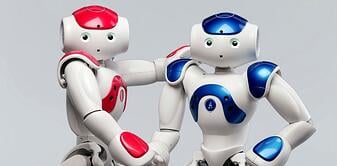profesional development for technology use
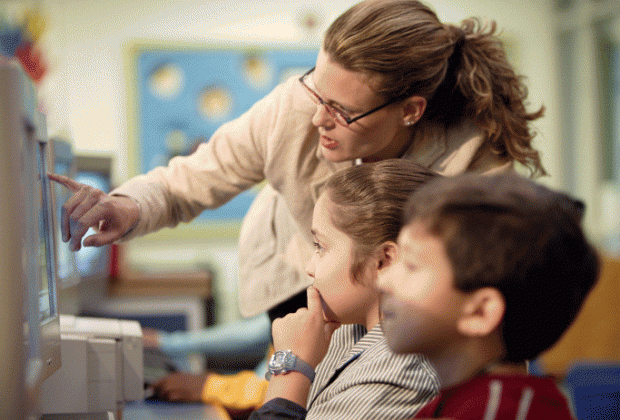
In an earlier post (Professional Development Tips) we discussed professional development courses for teachers as presented by noted educational consultant Tom Daccord of learning consultancy EdTech Teacher. Mr Daccord offered six tips that he believed would improve teacher professional development courses leading, of course, to improved teacher classroom effectiveness.
One point he made that we found particularly arresting was his insistence that it was no longer necessary or even wise for teachers to attempt to understand the “nuts and bolts of technology” when dealing with new tech teaching aids. Learning how to operate the new technology, something that students seemed to be able to do almost instinctively, was not as important as having a plan that would insure that these new tools were applied effectively in the classroom. Good pedagogy was to be preferred over technical proficiency. What adult, after all, can move his thumbs as fast as a teenager?
- 0 Comments
- Jul 15, 2014 4:39:16 PM
- Posted by Charles Nimrad
- Topics: EdTech, 21st Century Classroom
Meet the newest Math summer camp
Louisiana math teachers are stepping up their efforts to make teaching their discipline special. These are not your father’s math teachers. Nineteen of these new model teachers, five from Lafayette Parish middle school and fourteen others enrolled in UL-Lafayette’s Louisiana Mathematics Masters in the Middle program, a graduate course funded by a $1.8 million grant from the National Science Foundation, recently took math off the blackboard and out of the classroom to an Olympic-themed summer math camp held at J. Wallace James Elementary School, Scott La.
Lasting ten days and hosting more than 40 gifted students from at-risk Lafayette schools, this is a great example of a university and neighboring elementary schools cooperating in bringing fun -- that’s right, FUN -- the newest paradigm in math instruction, to students. Instead of learning math procedures by rote, these young people had a chance to see how math can be relevant to their lives and, yes, fun!
- 0 Comments
- Jul 9, 2014 7:55:10 PM
- Posted by Charles Nimrad
- Topics: Math, 21st Century Classroom
What Can We Do About Math Anxiety?

Parents, are you feeling guilty about inculcating your children with that educational scourge, Math Anxiety? Take heart, it might not be your fault. According to a recent study at Ohio State University, there is a genetic component to the malady. Says lead author Zhe Wang, “We found that math anxiety taps into genetic predispositions in two ways: people’s cognitive performance on math and their tendency toward anxiety..."
Which leaves us wondering, what can be done about math anxiety in teachers and students if math anxiety is genetic? I’m not a teacher and I haven’t been a math student for nearly half a century, but as a parent (Ok, Ok, a grandparent!) I’m relieved that yet another potential, parental guilt trip has been resolved in favor of nature rather than nurture.
- 0 Comments
- Jul 7, 2014 7:20:59 PM
- Posted by Charles Nimrad
- Topics: Math, Education, 21st Century Classroom
subvert the K-12 classroom -- Makerbot can help
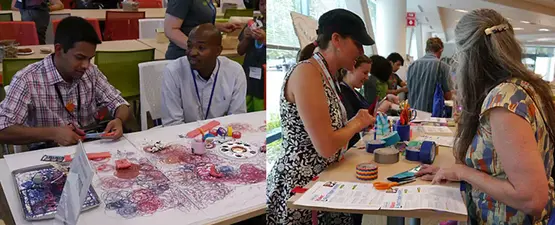
Students and teachers in the United States unite, you have nothing to lose but your boring textbooks (apologies to Karl Marx)! A revolution is in the Making -- pun intended! We must overthrow the dull, unimaginative educational processes that have sent so many of us running from the STEM subjects (Science, Technology, Engineering and Math). It won’t be easy; the present system has centuries of tradition and billions of dollars behind it. A direct onslaught won’t win this revolution ... we’re going to have to become subversives! Or, as Dale Doughterty, founder of Make Magazine and Co-Founder of Maker Faire put it last month at the 9th Annual Maker Faire in San Mateo, CA.,“I could probably make it easier for all of us if I said that [Making] aligns perfectly with all the educational standards and all the mainstream thought in education … But I think it’s actually subversive ... subversive because it’s causing change, and innovation … It’s a desire to change the way things are, and making in schools needs to be subversive if we’re going to invite kids to actually do things that are meaningful to them.”
- 0 Comments
- Jun 27, 2014 12:00:00 PM
- Posted by Charles Nimrad
- Topics: Education Politics, 21st Century Classroom
Two New Robot-Based STEM Learning Platforms at ISTE!
Studies continue to reinforce two issues upon which our company is built:
- Students need help with mathematics
- The American Diploma Project estimates that “in 62 percent of American jobs over the next 10 years, entry-level workers will need to be proficient in algebra, geometry, data interpretation, probability and statistics."
- According to research from Harvard University, "the percentages of high-achieving math students in the U.S.— and most of its individual states — are shockingly below those of many of the world’s leading industrialized nations."
- Twenty-nine countries outperformed the United States in mathematics by a significant margin according to The Program for International Student Assessment.
- Humans are visual learners
- The U.S. Dept. of Labor has found that information was retained significantly better when presented visually and orally in combination.
- Visual aids improve learning by 400%
- Even brain insights (those 'A-ha' moments) are being discovered in the brain's visual cortex
With all of this in mind, we are very pleased to announce two new resources for teachers looking to make STEM subjects like mathematics more engaging and more visual. We have developed tablet-based curriculum to accompany two of the more interesting products we have come across recently. Both of these will be publicly demonstrated for the first time next week at ISTE.
- 0 Comments
- Jun 26, 2014 4:05:00 PM
- Posted by Charles Nimrad
- Topics: 21st Century Classroom
Programming in elementary with cubelets
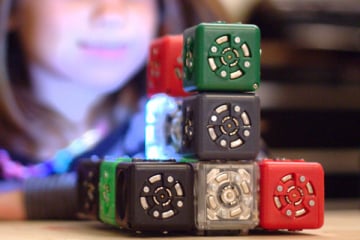
What are people saying about CUBELETS, the new robotic teaching aid from start-up Modular Robotics (a spin-off from Carnegie Mellon University, with funding from the National Science Foundation)? Time Magazine called them “one of the most interesting and accessible robots on the market today... a great way to teach kids about how robots work without actually having to solder or know anything about programming.”
Online magazine MakerShed, the magazine of do-it-yourself (DIY) digital projects, says “...we love Cubelets! These magnetic robot building blocks snap together and don’t require any programming, making it easy for anyone to build their own robotic creation. What could be more fun?”
- 0 Comments
- Jun 25, 2014 12:30:00 PM
- Posted by Charles Nimrad
- Topics: Robotics, 21st Century Classroom, Middle School, Kindergarten
How Can 3D printing help your students?

What can 3D printing do for education? No doubt everyone has their own list, but here is mine and it’s a short one: engage student interest and add relevance to the classroom.
Engage Student Interest
One definition of a “good teacher” is one who can interest students in the subjects they teach. A good teacher does not toss the information out there and hope it sticks somewhere. A good teacher tries to inspire interest in all their students, not simply the few gifted ones. A good teacher is always looking for ways to pique that interest -- and 3D printing is one of the best options around right now.
- 0 Comments
- Jun 24, 2014 12:00:00 PM
- Posted by Charles Nimrad
- Topics: 21st Century Classroom
Can NAO break through to autistic kids? A new study aims to find out
Can Aldebarans’ NAO robot actually help children with disabilities? According to anecdotal information gleaned from the experiences of educators and children at Shaler Academy in Ridgefield, N.J. and at Vanderbilt University, it seems that NAO’s calm, non-threatening approach lets autistic children feel they can come out of their shell safely and interact with NAO in a way they cannot with other children or adults. A new study is underway to find out how true those observations are.
- 0 Comments
- Jun 20, 2014 12:30:00 PM
- Posted by Charles Nimrad
- Topics: Robotics, EdTech, 21st Century Classroom
Meet Pepper, the robot who might become your best friend
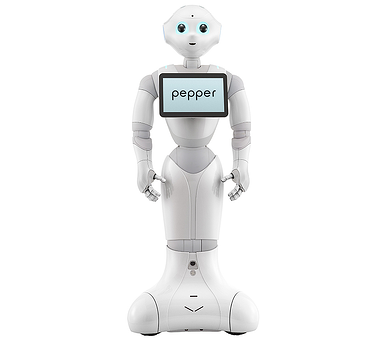
“If you want a friend in Washington, get a robot.” The Internet seems unsure of the origins of the much older phrase, "If you want a friend in Washington, get a dog." Either way, for the first time, it has become possible to get a robot if you want a friend.
Her name is PEPPER. PEPPER stands 48 inches tall and weighs 62 pounds. French robot developer Aldebaran designed the robot for Japanese mobile operator Softbank. Aldebaran, as you might be aware, is also the developer of the most widely distributed robot ever made, NAO. In fact, PEPPER looks like a taller NAO on a wheeled pedestal instead of two articulated legs.
- 0 Comments
- Jun 12, 2014 2:10:00 PM
- Posted by Charles Nimrad
- Topics: Robotics, NAO, International News
10 ways 3d printing can be used in education
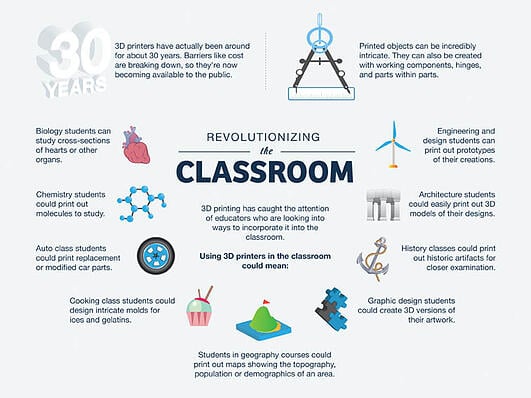
The infographic above serves as a great example of how swiftly things are changing in the EdTech world. At the time it found its way to the Internet, way back in February of 2013, there were indeed only ten ways that 3D printing could be used in education. Since then, an important eleventh way has been added: printing robots!
- 0 Comments
- Jun 10, 2014 8:03:00 PM
- Posted by Charles Nimrad
- Topics: Robotics, 21st Century Classroom, Project Based Learning
Relevant Posts
Popular Posts
Subscribe to Email Updates
-
I Want To Learn MoreADDITIONAL INFORMATION


